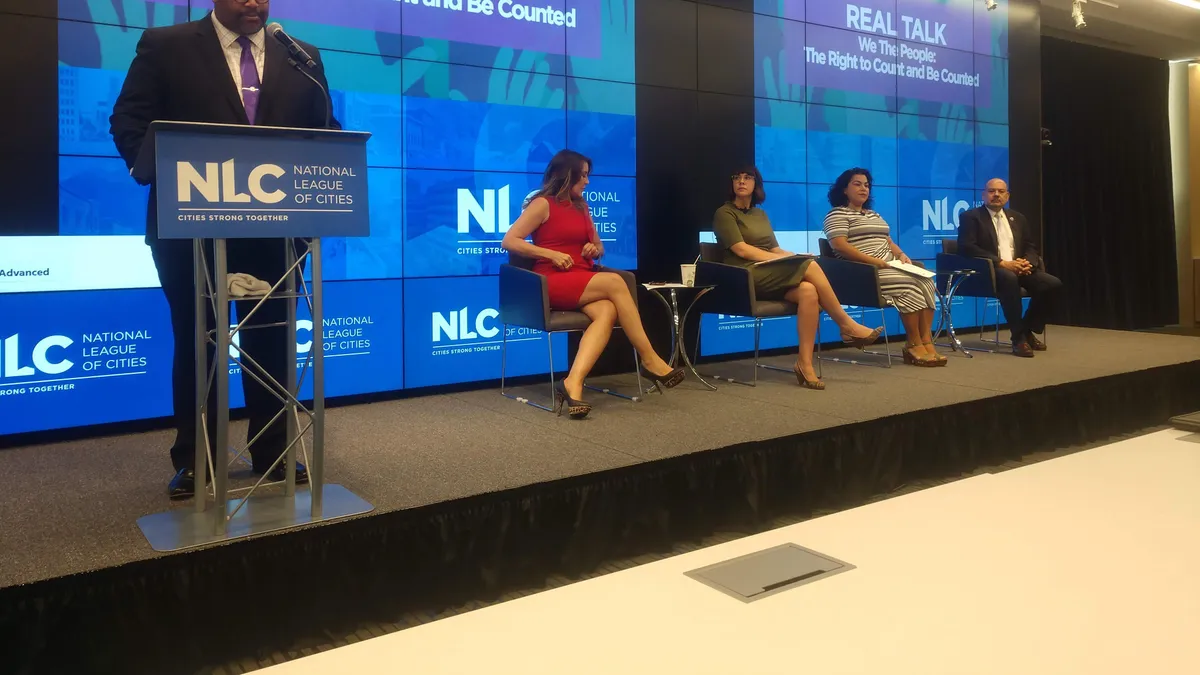Dive Brief:
- To build trust in the 2020 census and ensure accuracy, cities need an "all hands on deck operation" to engage as many community groups, nonprofits and philanthropic organizations as possible.
- During a panel discussion hosted by the National League of Cities in Washington, DC, Arturo Vargas, CEO of the National Association for Latino Elected Officials (NALEO) Educational Fund, said polling shows teachers, healthcare providers and religious leaders are more trusted than elected officials to disseminate census information. "These are the folks that people trust, and these are the folks that we need to get organized and involved in the census," he said.
- That trust deficit is not the only barrier, however. San Antonio Councilmember Rebecca Viagran said the digital divide could create an issue as the U.S. Census Bureau pushes online responses for the first time. She said it could be "one of the biggest barriers for some of our areas" participating, and it is incumbent on cities to provide areas like community centers, schools and libraries for people to respond.
Dive Insight:
The U.S. Supreme Court's decision to block the Trump administration's efforts to add a citizenship question to next year’s census left many breathing a sigh of relief, but panelists said there is still uncertainty ahead as many people struggle to trust the count. Trump has indicated the fight may not be over as he intends to use executive action to add the question.
Despite the noise that has surrounded the census and the legal challenges to the Commerce Department's efforts to add a citizenship question, Viagran said that one of the biggest tasks for local leaders is to raise awareness that the census is coming, and that it is important to participate.
"People just don't realize the census is coming up right now... Even with the rhetoric of the citizenship question, many people didn't understand what was happening," she said.
Participation is important to make sure an accurate count is carried out, which translates into helping governments draw legislative districts for the next decade and giving the federal government an indication of where to direct resources. But undercounts are common: Vargas said around 2.1 million children were not counted in the 2010 census while 1.1 million were overcounted, with those undercounted typically coming from poor and minority communities.
Vargas added that in focus groups, participants have found a resonance in the message that the census will help their communities by potentially bringing in federal resources and giving them better political representation. Viagran said that in general, it is imperative for cities to seek as many perspectives as possible when addressing local issues.
"What makes you part of this conversation is you want to give voice, you want to make the community better, safer, stronger," she said.
As time ticks before the count officially starts in March, fellow panelist Angela Garcia, an assistant professor at the University of Chicago School of Social Service Administration, said she is confident that cities can step up and get people involved in the census. That confidence comes as cities have stepped up to lead on other issues like the environment, immigration, homelessness and the minimum wage.
"I have a lot of optimism around the energy in cities because cities understand what's at stake," Garcia said.












